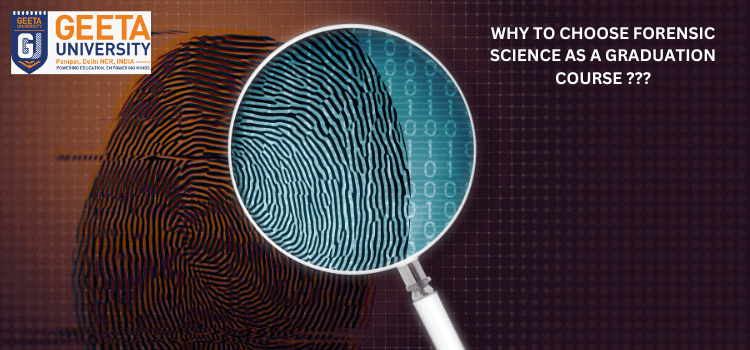
Why To Choose Forensic Science As A Graduation Course? – Geeta University
The word “forensic” has its origin from the Latin word “Forensis,” which means “forum”.
Forensic is a branch of science that deals with the application of science in law. As the world’s population is increasing day by day, crime is also increasing. In our smart era, criminals have become more sophisticated in their techniques and try to commit crimes without leaving any traces or evidence. For example, scammers may call and deceive people into giving away their bank details, leading to cybercrime.
When someone becomes a victim of such cybercrime, they can report it to the police, who will write an FIR and send it to a special division called Cyber Forensic. This branch of forensic science deals with cybercrime.
Forensic science is a broad field that includes a multitude of practices, such as DNA analysis, bloodstain pattern analysis, firearms examination and ballistics, tool mark analysis, and forensic psychology, biology, serology, medicine, dermatoglyphics, document analysis, anthropology, ballistics, toxicology, linguistics, and accounting.
Most forensic science candidates are hired by government agencies such as CBI, RBI, RAW, IB, CFSL, SFSL, police, banks, and income tax departments. To pursue a career in forensic science, one must complete a BSc and MSc in forensic science. One of the topmost universities for forensic science in Haryana is Geeta University where you can have a practical exposure related to the course.
The scope of forensic science is vast, covering various disciplines that play a crucial role in solving crimes and providing evidence in courtrooms. Let’s delve into some of the key areas of forensic science and explore their significance in the criminal justice system.
1. Forensic DNA Analysis:
DNA, the genetic material found in cells, has revolutionized forensic science. DNA profiling, also known as DNA fingerprinting, is used to identify individuals with an unmatched level of accuracy. DNA can be extracted from various biological samples such as blood, saliva, hair, and tissues, and can be compared to samples collected from crime scenes or suspects. DNA analysis has helped solve numerous cases, including cold cases that remained unsolved for years, by linking suspects to crime scenes or victims.
2. Forensic Toxicology:
Forensic toxicology involves the analysis of drugs, alcohol, and other toxic substances in biological samples for legal and investigative purposes. Toxicology plays a crucial role in cases involving drug-related offenses, driving under the influence (DUI), and suspicious deaths. The results of toxicology tests can provide evidence of the presence or absence of drugs or alcohol in a person’s system, helping to determine the cause of death or impairment.
3. Forensic Fingerprints:
Fingerprint analysis is one of the oldest and most reliable methods of identifying individuals. Each person’s fingerprints are unique, and forensic experts can collect, analyze, and compare fingerprints found at crime scenes with those in databases to establish links between suspects and crime scenes. Fingerprint analysis has been widely used in solving cases ranging from thefts to murders, and has helped exonerate innocent individuals who were wrongly accused.
4. Forensic Anthropology:
Forensic anthropology involves the analysis of human remains in a medico-legal context. Forensic anthropologists can determine various aspects such as the age, sex, stature, and ancestry of skeletal remains, and can also help identify victims of mass disasters or crimes. They can provide critical information to investigators and assist in the identification of unknown individuals, shedding light on the circumstances surrounding their deaths.
Conclusion:
Forensic science plays a vital role in the modern world, where crime is becoming more complex and sophisticated. It helps law enforcement agencies solve crimes by analyzing various types of evidence. With the increasing demand for forensic science professionals, pursuing a career in this field can lead to exciting and challenging job opportunities. However, it requires a strong academic background and specialized training. With the right education and training, one can make a valuable contribution to society by helping to bring criminals to justice and ensuring the safety of the community.
- By Pranav Kumar
Related Posts
Unveiling Nature’s Secrets: The Role of Forensic Botany in Criminal Investigations
Introduction Within the field of forensic science, the process of investigating crimes frequently conjures up ideas of ballistics, fingerprinting, and DNA analysis. However, forensic botany

Why Choose MCA Program – Geeta University
Why Choose MCA Program – Geeta University After earning a Bachelor of Computer Application or any bachelor’s degree relating to computers, students can pursue a

The 5 Most In-Demand Career Fields for BBA Program Graduates – Geeta University
The 5 Most In-Demand Career Fields for BBA Program Graduates – Geeta University How many of you wonder what the best careers are for BBA


